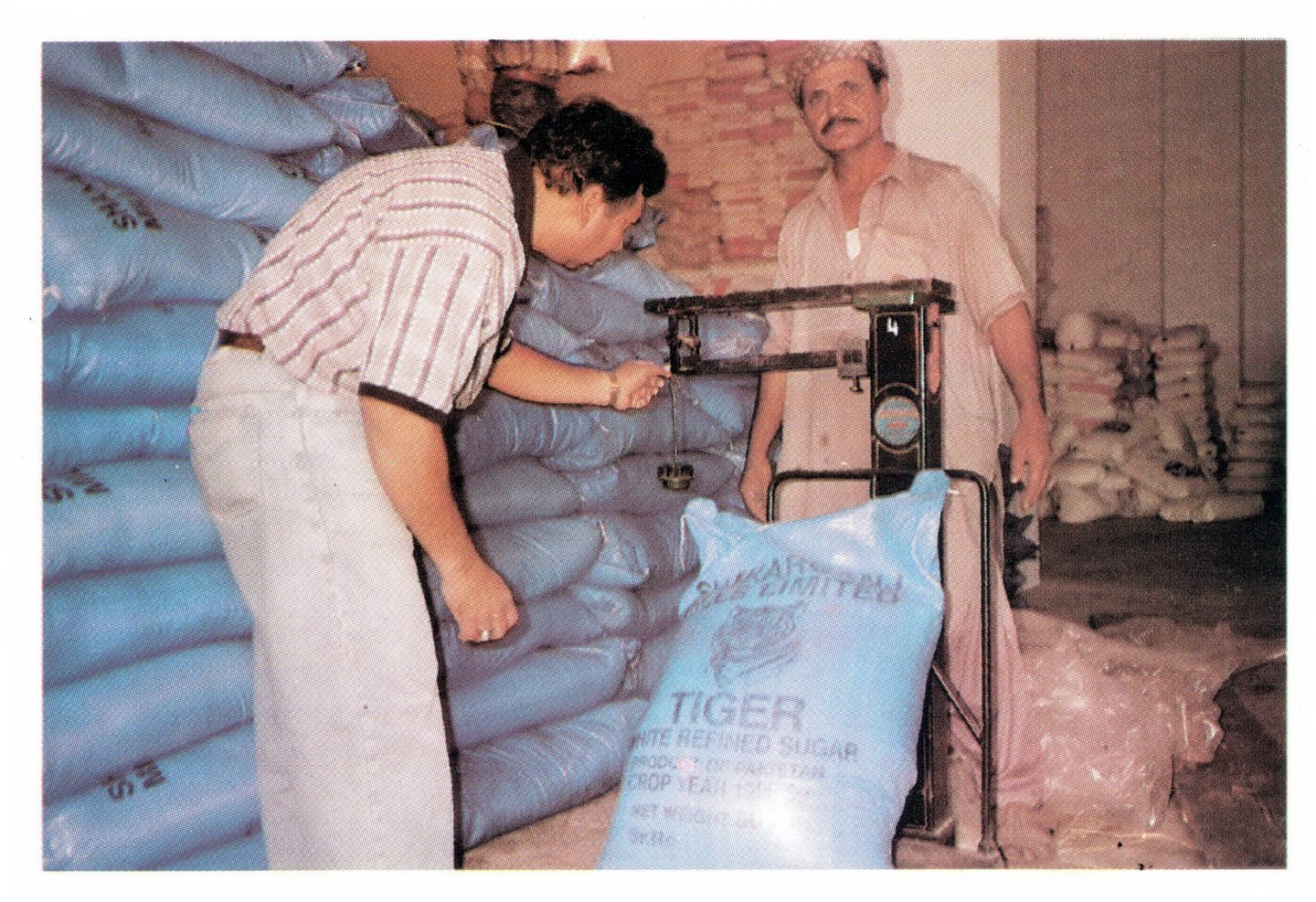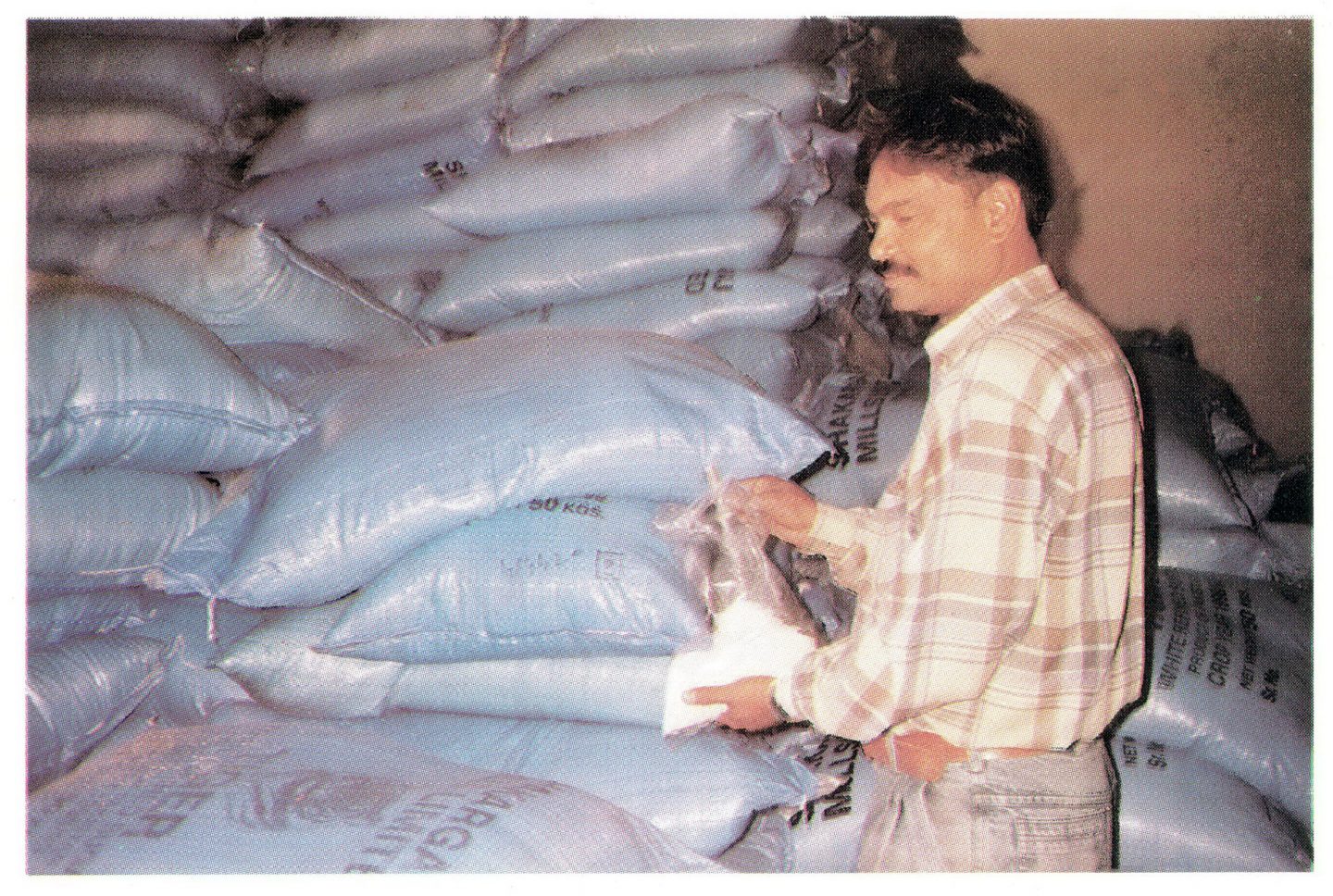Grains, Sugar, Oils, Fruits, Vegetables & Fish Inspection
Grain/Sugar
International trade of bulk cargoes is subject to many hazards which may compromise quality, resulting in major losses to those involved, becoming increasingly uneconomical; therefore the job supervision and control was given to specialized neutral third party organizations. We also provide these specialized services to ensure quality, quantity verification and safe transfer to destination. In all such activities GAFTA and FOFSA procedures form the basis of our work. Our services include:
- Weight and quantity verification- This also involves checking of packing, marking, size and weight. Checking is usually done on a random selection basis on a percentage of total consignment, as required by client.
- Packing type verification. Whether packing material and markings meets customer specifications.
- Sampling/Testing & quality verification. Random samples are drawn from pre specified percentage of cargo.
- Damage cargo surveys. Samples are drawn and sent to laboratories to ascertain type and extent of damage.
- Supervision of ship loading/discharge operations
Rice is a unique and highly significant crop, thought to help feed nearly half the planet on a daily basis. An understanding of its properties and their significance is essential for the provision of high quality products. This is all the more true today as international trade in rice trade has increased rapidly in recent years.
Any international contract of rice will invariably involve the following minimum quality specifications, which are to be checked and verified during Pre Shipment Inspection:
- Rice Type
- Crop Year
- Color
- Grain type/size
- Broken percentage allowed
- Polish type
- Sortexed
- Foreign matter
- Fumigation
Edible Oils
The most commonly referred international standards are CAC/RCP 36 called the International Code of Practice for the Storage and Transport of Edible Fats and Oils in Bulk. ISO 5555, Sampling Standard and FOFSA International Code of Practise, suffice to cover all aspects of shipments of edible oils. Our inspectors assigned for such inspections are conversant with Transportation, Sampling and Survey of tank requirements etc.
Wherever required samples are drawn in accordance with guidelines and submitted to laboratory for requisite tests.
Fruits and vegetables
With a very limited shelf life fruits and vegetables have a separate protocol to ensure that they reach the end consumer in good condition. This may entail a farm to market review of the supply chain. Apart from weight, quantity, quality check, the cleanliness, packing and fumigation requirements are critical. Refrigeration and maintenance of requisite temperature checks are also conducted and reported. In case other freshness extending technologies have been used, their efficacy is checked and reported.
We are experts in the field of chilled and frozen produce, including:
- Vegetables
- Fruit
- Fish
- Meat
- Dairy products
- Flowers
- Other perishable products.


Clients Served
| AgroGrain Ltd | Al Hamza Trading Company | Andre Far East Inc |
| Bulog Indonesia | Edible Oil Corporation Of Pakistan | Food Commissioner Sri Lanka |
| Food & Agriculture Organization | Gialdini TRE | Hassan Ali Rice |
| Jaffar Brothers | National Food Authority Philippines | Panchaud Freres |
| Royal Foods Trading Company | Trading Corporation of Pakistan | Vitra AG Zurich |
| World Food Program |
Frozen Fish
Fish is a highly perishable food which needs proper handling and preservation if it is to have a long shelf life and retain a desirable quality and nutritional value. The central concern of fish processing is to prevent fish from deteriorating. The most obvious method for preserving the quality of fish is to keep them alive until they are ready for cooking and eating. Commonly used methods to preserve fish and fish products include:
- The control of temperature using ice, refrigeration or freezing
- The control of water activity by drying, salting, smoking or freeze-drying
- The physical control of microbial loads through microwave heating or ionizing irradiation
- The chemical control of microbial loads by adding preservatives.
- Oxygen deprivation, such as vacuum packing
Usually more than one of these methods is used. When chilled or frozen fish or fish products are transported by road, rail, sea or air, the cold chain must be maintained. This requires insulated containers or transport vehicles and adequate refrigeration. Modern shipping containers can combine refrigeration with a controlled atmosphere.
Storage temperature and stability of temperature maintained is most essential and is the first checkpoint in any such inspection.
Pre Shipment Inspection of Frozen Sea Food normally requires that 10% of consignment is to be checked, however, this may vary depending on the terms settled between buyer and seller. The total numbers of cartons comprising inspection consignment are verified, markings on consignment noted and requisite number of cartons are randomly selected for further detailed checking. Gross and net weight of each carton is checked and noted.
Size/weight of fish has to be checked to verify contract requirements. This is specified as number of pieces per Kilo or any unit of weight specified in contract.
IQF (Individually Quick Frozen) is a term almost invariably found in contracts related to frozen food consignments. IQF is a method that does not allow large ice crystals to form in individual pieces. Also, since each piece is individually frozen, particles do not cohere, and the final product is not frozen into a solid block. This allows each piece to be checked separately for the following possible defects;
- Belly burst
- Red eye
- Skin peel
- Wound mark/s
- Blood stain on fish body
- No broken pieces
- Any special instruction from buyer
All pieces found defective are removed, and if available fresh pieces without defect, added to complete the consignment.
Loading supervision into refrigerated containers is usually part of the assignment, which is certified by sealing the container with company seal.
Clients Served
| ABC Fishing Corporation | Ailya International Fisheries (Pvt.) Ltd. | Akhlaq Enterprises (Pvt.) Ltd. |
| China National Fisheries Corporation | Hebei Foodstuffs Import/Exports Corporation | Hyosung HK Ltd. |
| International Fisheries (Pvt.) Ltd. | Kanpa International Sales | Mukhi Noordin & Sons |
| Nutricia Foods International | Ningbo International Fisheries Corporation | Mekran Fisheries (Pvt.) Ltd. |
| Pak Export Traders | Quality Pre-Mix SDN Super Star Enterprises | Ted Fulop Seafoods |
Bone Meal & Fish Meal Inspection
Meat and bone meal (MBM) is a by product of the meat industry. It is primarily used in the formulation of animal feed to improve the amino acid profile of the feed and is mainly used as a low cost protein additive in dog and cat food.
Alternately, it is now being used as a fossil-fuel replacement for energy generation, as a fuel for incineration and for the generation of renewable electricity. It is increasingly used in cement kilns as an environmentally sustainable replacement for coal.
Fish byproducts have been used to feed poultry, pigs, and farmed fish. Fish meal is primarily used as a protein supplement used mostly in compound feed for farmed fish, poultry feed and also finds usage in organic fertilizer.
Pre Shipment Inspection of these products mainly includes certification of Quality, Weight/quantity and Fumigation.
Samples are randomly drawn from shipment lot and sent to independent laboratory for verification of physical and composition analysis. If consignment is bagged, the quality of bags, weight, marking etc., are checked and noted.
Since these are organic materials prone to decomposition and bacterial infection, fumigation with proper strength fumigation agents as required is done under our supervision and containers are sealed by us. Certificates of Quality/Analysis, Weight and Fumigation are an essential part of Shipping Documents in such consignments.
Clients Served
| Al Nahaam Trading Est | Clauss & Paschke GMBH | Haytech Marketing Limited |
| Intertrade | J. C. Gilbert Limited | Landauer Limited |
| M. I. Mullan Bone Mills | Najib Bone Mills | Nichimen Corporation |
| Premier Freight Services Limited | Rehman Crusher | Rousselot SAS |
| Sanofi Bio Industries | Shoyoma Company Limited | SKW Bio Systems |
| Star Glue Company | Sumitomo Corporation | System Bio-Industries |
| T.C. Takada Company Limited | Tomen Corporation |
